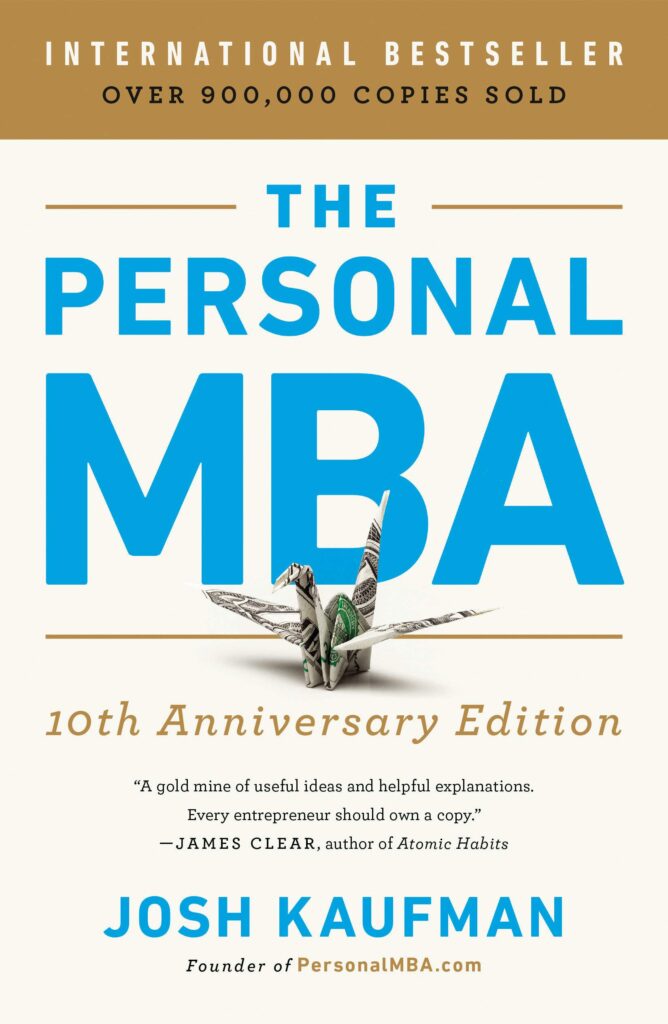In a world where the cost of a traditional Master of Business Administration (MBA) program can be prohibitively expensive, Josh Kaufman’s “The Personal MBA: Master the Art of Business” emerges as a compelling alternative. Kaufman challenges the conventional wisdom that an MBA is a necessary credential for business success. Instead, he offers a distilled version of essential business knowledge, accessible to anyone willing to put in the effort to learn independently. In this ‘The Personal MBA’ Book Review, we are going to dive inside this book and find out why has it been a massive success!
“The Personal MBA” is not just a book; it’s a movement that advocates self-education in business. Kaufman argues that business schools do not have a monopoly on valuable business knowledge, and that the key concepts of business can be learned independently at a fraction of the cost and time commitment of a traditional MBA. In this ‘The Personal MBA’ Book review, we will explore the structure, content, and impact of “The Personal MBA,” analyzing its strengths, potential weaknesses, and its overall contribution to business education.
‘The Personal MBA’ Book Review
Kaufman organizes “The Personal MBA” into five distinct sections, each addressing critical aspects of business:
Value Creation
This section introduces the reader to the concept of value, which Kaufman asserts is the foundation of every successful business. He emphasizes that businesses exist to solve problems for customers, and the ability to create value is what separates successful businesses from unsuccessful ones. The discussion covers product development, marketing, and sales, providing a holistic understanding of how value is created and delivered.
Marketing
In this section, Kaufman delves into the intricacies of marketing, explaining how businesses can effectively communicate their value to potential customers. He introduces concepts such as market segmentation, customer targeting, and brand positioning. The section also covers the psychological aspects of marketing, exploring how customers make decisions and what influences their buying behavior.
Sales
Sales are the lifeblood of any business, and Kaufman dedicates a significant portion of the book to this crucial function. He explains various sales techniques, from direct selling to creating effective sales funnels. Kaufman also emphasizes the importance of understanding the customer’s needs and building trust, which are key components of a successful sales strategy.
Value Delivery
Once a sale is made, delivering value is the next critical step. This section discusses how businesses can ensure that they meet or exceed customer expectations through efficient operations, supply chain management, and customer service. Kaufman stresses the importance of reliability and consistency in value delivery, as these factors greatly influence customer satisfaction and loyalty.
Finance
The final section of the book deals with the financial aspects of running a business. Kaufman simplifies complex financial concepts, making them accessible to readers without a background in finance. He covers topics such as cash flow management, financial statements, and investment strategies. The focus is on understanding how financial decisions impact the overall health of a business.
Throughout these sections, Kaufman introduces over 100 business concepts, each accompanied by practical examples and actionable advice. The book’s structure is modular, allowing readers to jump to sections that are most relevant to them. This makes “The Personal MBA” not only a comprehensive guide but also a practical reference tool.
Key Strengths
Accessibility
One of the greatest strengths of “The Personal MBA” is its accessibility. Kaufman writes in a clear, straightforward style that makes complex business concepts easy to understand. This is particularly important for readers who may not have a formal background in business. By breaking down concepts into digestible chunks and avoiding jargon, Kaufman ensures that his ideas are accessible to a broad audience.
Practicality
Unlike traditional MBA programs, which often focus on theoretical knowledge, “The Personal MBA” is grounded in practical application. Kaufman’s advice is actionable, with each concept accompanied by real-world examples that illustrate how it can be applied in a business context. This practical focus makes the book a valuable resource for entrepreneurs, managers, and anyone looking to enhance their business acumen.
Self-Education Advocacy
“The Personal MBA” is more than just a book; it’s a manifesto for self-education. Kaufman empowers readers to take control of their own learning, challenging the notion that an expensive degree is necessary for success in business. By providing a comprehensive guide to essential business concepts, Kaufman makes it possible for anyone to acquire the knowledge they need to succeed, regardless of their financial situation or educational background.
Comprehensive Coverage
The breadth of topics covered in “The Personal MBA” is impressive. Kaufman manages to cover a wide range of business functions, from marketing and sales to finance and operations, all within the confines of a single book. This comprehensive coverage makes “The Personal MBA” a one-stop resource for anyone looking to gain a broad understanding of business.
Modular Structure
The modular structure of the book is another strength. By organizing the content into distinct sections, Kaufman makes it easy for readers to focus on the areas that are most relevant to them. This also allows the book to serve as a reference guide, with readers able to return to specific sections as needed.
Potential Weaknesses
Depth of Content
While “The Personal MBA” covers a wide range of topics, some readers may find that the depth of coverage is lacking in certain areas. Because the book is designed to provide a broad overview of business concepts, it sometimes sacrifices depth for breadth. Readers looking for in-depth analysis or advanced discussion of specific topics may need to supplement the book with additional resources.
Lack of Interaction and Networking
One of the primary benefits of a traditional MBA program is the opportunity to network with peers, professors, and industry professionals. “The Personal MBA” does not offer this networking component, which can be a significant drawback for some readers. While Kaufman provides a wealth of knowledge, readers miss out on the interactive and collaborative aspects of a traditional MBA experience.
Self-Motivation Required
“The Personal MBA” is a self-directed learning resource, which means that readers need to be highly motivated and disciplined to get the most out of it. Unlike a structured MBA program, where assignments, exams, and deadlines drive progress, “The Personal MBA” requires readers to set their own pace and goals. This can be challenging for individuals who thrive in more structured learning environments.
Generalization
Because “The Personal MBA” is designed to be broadly applicable, some of the advice may come across as overly generalized. Business is a complex and nuanced field, and while Kaufman provides a strong foundation, the specific needs and challenges of different industries or individual businesses may not be fully addressed. Readers may need to adapt the concepts to fit their unique circumstances.
Impact and Reception
Since its publication, “The Personal MBA” has had a significant impact on the business education landscape. It has been embraced by a wide range of readers, from aspiring entrepreneurs to seasoned professionals, who appreciate its practical approach to business education. The book has also sparked a broader conversation about the value of traditional MBA programs, with many questioning whether the high cost and time commitment are justified given the availability of alternative learning resources like Kaufman’s book.
Critics of traditional MBA programs have praised “The Personal MBA” for democratizing business education, making essential knowledge accessible to a wider audience. However, some traditionalists argue that the book cannot fully replicate the experience and benefits of a formal MBA program, particularly in areas like networking and hands-on learning.

Conclusion
“The Personal MBA: Master the Art of Business” by Josh Kaufman is a valuable resource for anyone looking to gain a comprehensive understanding of business without the time and financial commitment of a traditional MBA program. Its accessibility, practicality, and comprehensive coverage make it a standout resource in the world of business education.
While it may not replace the networking opportunities and depth of study provided by a traditional MBA, “The Personal MBA” offers a compelling alternative for self-motivated individuals who are eager to learn and apply business concepts in the real world. Kaufman’s book is a testament to the power of self-education and a reminder that the path to business success does not have to be paved with student loans and classroom lectures.
So this was ‘The Personal MBA’ Book Review from. For anyone looking to enhance their business knowledge, whether they are just starting out or are seasoned professionals, “The Personal MBA” is a worthwhile investment in their personal and professional development.

